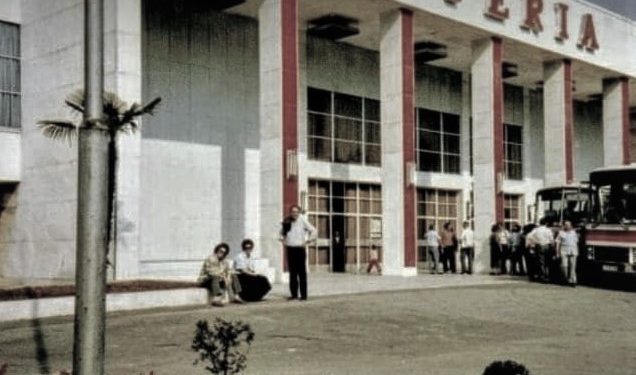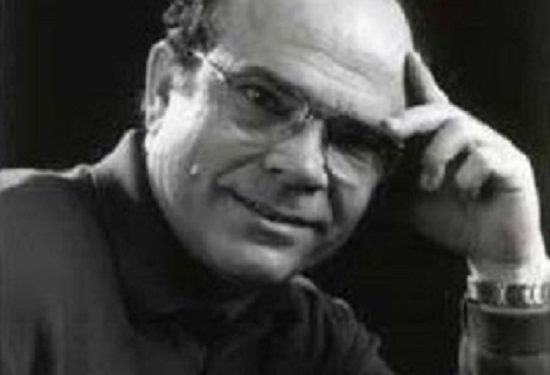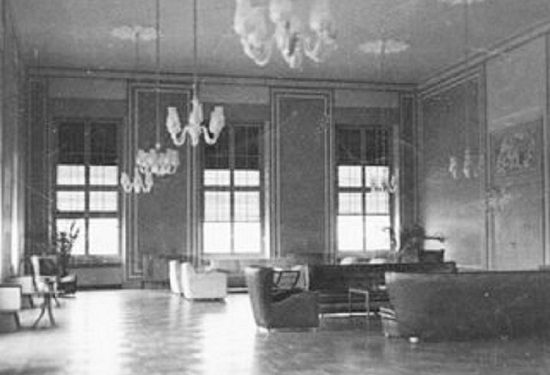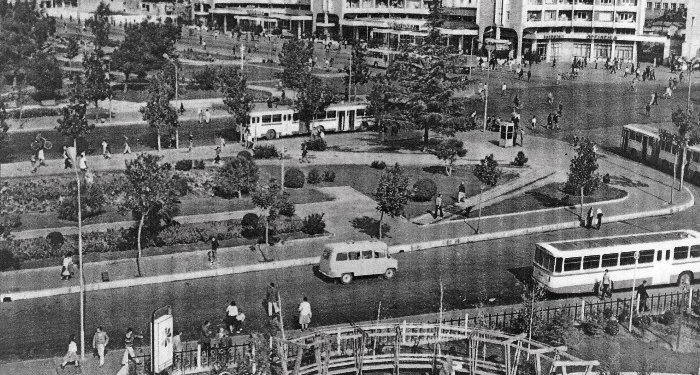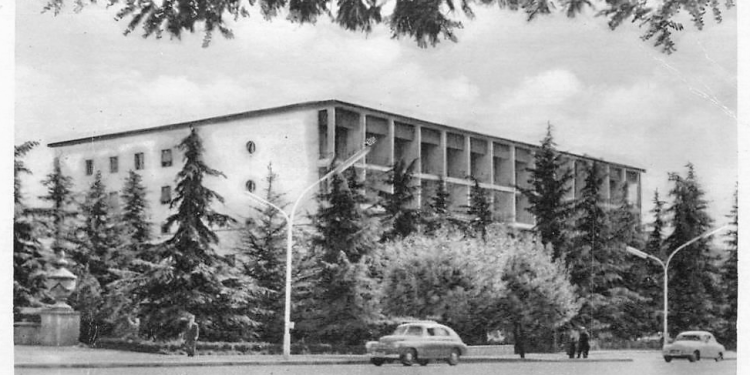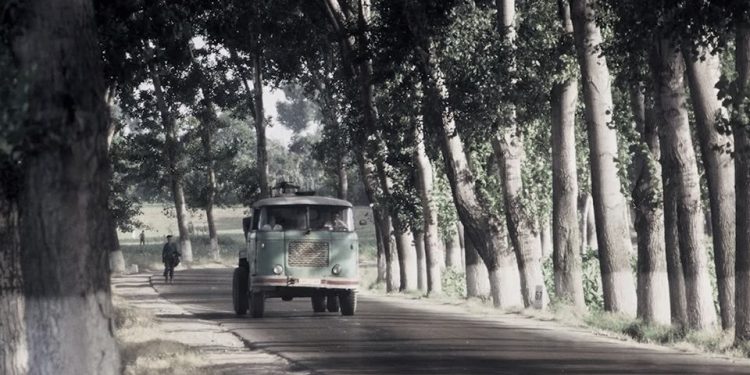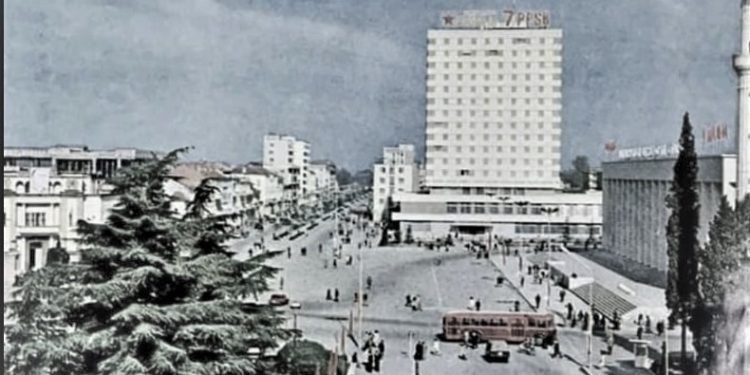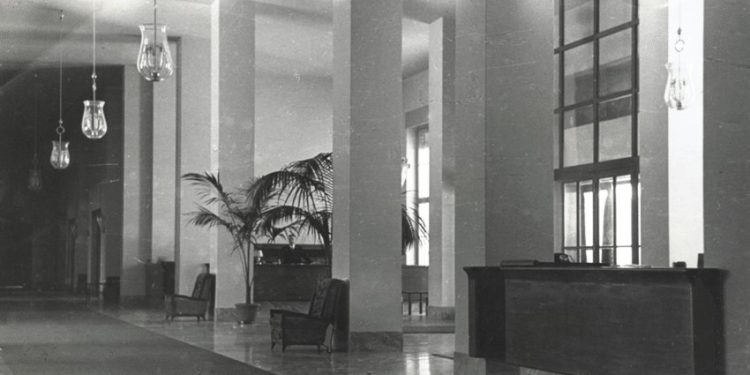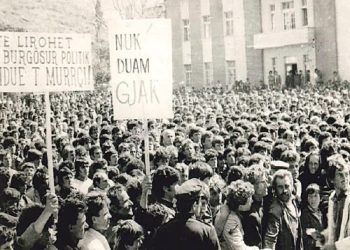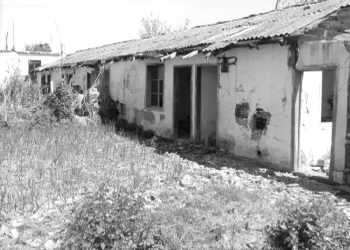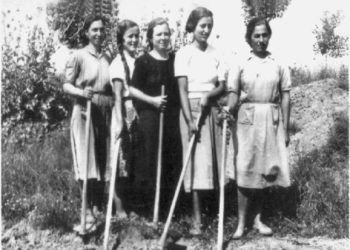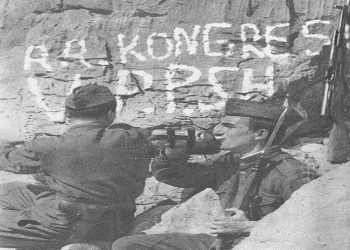By Vasil Qesari
Memorie.al / At that time, many, many years ago, we were a group of fellow students of the Faculty of Philology, that almost every evening, sitting there in front of the “Dajti” Hotel, right on the curbs of the “Rinia” Park, we contemplated the beginning of the famous traditional tour of Tirana where thousands of young men and women, high school students, students, workers, intellectuals and families, spent their free time walking back and forth, between the large promenade that started from the central building of the University, continued to the editorial office of the newspaper “Zëri i Populli”. That collective tradition became so necessary that many thought that Tirana would be a real Sahara without its evening tour.
(The shoot – that huge scene with thousands and thousands of comic-tragic characters which could not be found in any other capital of the world, was also the most impressive spectacle for every foreigner visiting Albania. For many of them, that senseless movement of that brown river of people, rather than fun or entertainment, resembled the round that the convicts made regularly and at certain hours in the political prisons.
This finding was completely accurate and appropriate, if we consider that Albania itself in those years was nothing but a big prison, where people went out every evening, as if on command, to get some air, too relaxed and to greet each other …)
Not only “Skënderbej” Square and “Dëshmorët e Kombit” Boulevard, but also the whole center of Tirana, have not always had the appearance they have today: full of cars, kiosks, bars, kebab shops, kumbis, polishers, businessmen, banana sellers, clutter , mud, dust and people pushing to cross from one sidewalk to another.
No…! Many years ago, it, like every other part of the capital, was very quiet, less people, shops and traffic and more signs, banners, green trees and plots planted with flowers. A real dream for European environmentalists!
For the few foreigners who visited Albania at that time, it evoked an original impression. “The center of the Albanian capital – wrote Christophe L. – in French daily, there from the end of the 70s – although with the lack of car movements and noisy traffic, it creates a strange suffocating feeling.
Amidst that mass of almost deserted asphalt, surrounded by dumb and uniform facades of buildings, you look small and terribly delicate. Apart from the people riding on the side of the boulevard on their strong and extremely tall bicycles, the eye sees very few vehicles that can even slightly disturb the tranquility of that noiseless place.
They are, mainly, some red city buses full of people and an occasional official vehicle. Among the latter, there are some Russian or Chinese “Jeeps” and some luxury cars of high party leaders, usually new “Benz-Mercedes” and some “Fiat” or “Warsaw” – with who, in most cases, travel officials, friends of Albania, foreign or Marxist-Leninist delegations invited for vacations.
Consequently, the impression is created that the lack of cars and vehicles in general is a deep sign of poverty, while even on the roads of Timbuktu, Dakar or Ouagadougou, there is more traffic than in Tirana…!
But, on the other hand, as soon as the evening fell on the capital and the neon lamps lit up on the tall metal pillars, the “Skënderbej” Square, the “Stalin” Boulevard and the “Dëshmorë te Kombit” Boulevard were buzzing with noise and filled to the brim with people. . They came out in groups from every neighborhood, turned the street and poured towards its center as if directed by command”.
…Among that suffocating and extremely monotonous environment, for us, the young university students, only Hotel “Dajti”, (with the glow of the neon lights that gently reflected their violet color on the crests of the gray firs, the sounds of the foreign melodies of the orchestra of the Night Club, the reflections of the crystal windows of the luxury cars of the diplomatic corps), presented the attraction and magic of another world, completely different from the one around us. Of course, this was not simply because of his outward appearance.
Hotel “Dajti”, above all, and this was the most important, the only residence of foreigners who were in or visited Albania at that time. Thus, it seemed to us not only part of a mysterious planet, but at the same time very distant and inaccessible. It was exactly there that hosted the majority of the five or six thousand Swedish, Norwegian, Danish, Dutch, German and English tourists who visited the land of eagles on average every year.
In addition to that connection with the outside world, (that is, what we called the other planet, which was eternally, strictly and absolutely forbidden for each of us), Hotel “Dajti” also had something else very special: the history of his original. Built during the period of fascist occupation, it was a typical example of Mussolini architecture.
Right after the invasion, the Italians wanted to change the appearance of the primitive Albanian capital, starting the implementation of a series of Romanesque neoclassical projects. Thus, very soon, the euphoria of the successful military campaign in Albania turned the center of Tirana into a large construction site.
According to the drawn up projects, the Italians would build an imposing urban complex in the capital, which would become not only a symbol of the new fascist culture, but also of the presence and influence of the former Roman imperial influence throughout the Balkans.
But, unfortunately for the Albanians, the Italians failed to complete their ambitious project for the Alla-Roman transformation of Tirana. (However, even to this day, after more than 80 years, the constructions carried out by them are part of the pride of the most beautiful buildings of the Albanian capital).
All these, therefore, gave Hotel “Dajti” an extremely magnetic and suggestive power. For that reason, often during the evenings, especially young people, they took walks alone, next to him. Just for the heck of it.
To see up close the luxury foreign buses as well as their fluorescent license plates with the initials of various western cities. And then, and this is of course the most important, the tourists who came down from them. In most cases elderly people, but often also young men and women.
Oh God! – Says my classmate, (D.M.): – “They, even though they are human beings, are completely different from us”!
And, then, he took it to his heart and sighed worriedly… D.M., you were right. Those people, who set foot on Albanian soil, getting down gracefully from their air-conditioned buses, gave the impression that they came from far away. From terribly far away.
It looks like they stepped off the board of a spaceship. So, just like they landed from another planet. Indeed, they were quite different from us!
Special and divine in everything. In movement, behavior, smile. In the redeemed way of walking. In freedom of communication.
In jewelry, light, breezy and colorful clothing. In the charm of pink, clean and delicate faces. (That color, which we had seen only during the May 1st parades, of course, on the well-fed faces of the members of the Political Bureau and other senior leaders of the Party and the State).
They, the tourists, passed by leaving behind, magically, a light perfume that we had never smelled. A fragrance that made you feels yourself among imaginary meadows full of exotic flowers.
But, think! That daze only lasted a few moments. So much so that it was time to cross that piece of sidewalk in front of the hotel, which started from Stalin’s bust and continued until the turn of “Marcel Kashen” street. Because, in front of the hotel, it was strictly forbidden to stay for more than a few minutes.
In fact, every time we passed on the sidewalk in front of “Dajti”, apart from the excitement that brought us the presence of foreigners in our isolated capital, we also encountered something else, which scared us quite a bit. In front of him, with stern and watchful looks, some civilians kept walking up and down, as if by chance.
Security people were always there. They watched all around, not escaping not only every movement of strangers, but also everyone else who entered and left the hotel. Other civilians, even more in number than those outside, were inside it. It seemed that Sigurimi had placed his authority, precisely in “Dajti”…!
His civilians were everywhere. In thin, hallways, bar, restaurant, sitting on couches, reading the newspaper, smoking and peering suspiciously around. Moreover, that task was carried out by the hotel’s own inflated staff who, in addition to routine services, investigated, eavesdropped and reported on every suspicious movement, conversation and meeting of tourists. In fact, that the hotel in question was the headquarters of the State Security, it was not something unknown. Of course, everyone knew that…!
This was the reason why people, in general, when they passed in front of him, felt annoyed and embarrassed by something incomprehensible. For this reason, they hurried their steps and passed quickly, looking only straight. Neither left nor right. Sometimes, with their heads down under the dense crowns of fir trees, which fell so low on the sidewalks, that it seemed as if they wanted to say to them: – “Hey, stop, where are you going…?! Passing is prohibited here…”! Memorie.al




